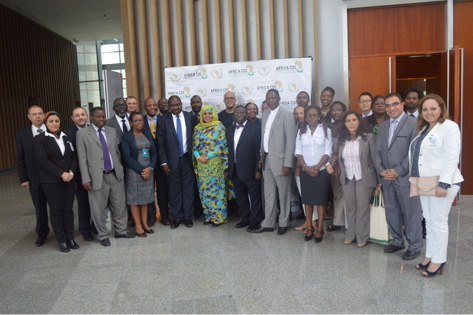Africa’s new strategy to respond to disease threats a game changer in global health security
Africa’s new strategy to respond to disease threats a game changer in global health security
In July 2013, Heads of State and Government directed the African Union Commission to establish the Africa Centres for Disease Control and Prevention (Africa CDC). A year later, the unprecedented Ebola outbreak hit the West African sub-region, demonstrating that public health is inextricably linked to economic, social, and security issues and providing further impetus to move quickly to establish the institution. The outbreak resulted in over 11,000 deaths and more than $2 billion in economic losses, in addition to decreases in investment and private sector growth, a decline in cross-border trade, and reduced agricultural production. The speed and severity of the Ebola outbreak highlighted the need for improved preparedness to prevent, detect, and respond to emerging disease threats. Since formally opening for business in January 2017, the Africa CDC has started deploying its emerging capabilities and assets to respond swiftly to disease outbreaks across Africa while beginning to implement its strategic plan.
Building blocks of the strategy
The five-year strategy is built around five pillars: surveillance and disease intelligence, information systems, laboratory systems and networks, emergency preparedness and response, public health research and institutes. The strategy provides a clear vision and direction for the institution to fulfil its mandate to provide timely, actionable, and continent-wide surveillance and disease intelligence data, rapid deployment and coordination of technical expertise for outbreak response, health diplomacy, and seamless, well-coordinated regional laboratory and surveillance networks across Africa. The Africa CDC is promoting and strengthening these capacities within the African Union Member States in collaboration with Regional Collaborating Centres in Zambia, Kenya, Gabon, Egypt and Nigeria.
Immediate priorities
Within the next two years, Africa CDC will support the establishment of centralised event-based surveillance for priority diseases in Africa working with its five Regional Collaborating Centres. The Africa CDC will also establish a rapid response team to address health threats, supplemented with a continent-wide Africa Health Volunteers Corps. The Africa CDC will further define protocols for outbreak declaration and response while advocating for the establishment of Emergency Operational Centres in each country. The Africa CDC will define a system to organise national surveillance data and work towards uniform health information standards for Africa. It will concurrently work on creating policy frameworks to guide countries to strengthen their public health institutes. The implementation of these immediate priorities will require United States dollars 34.4 million. The Africa CDC is already mobilising resources from its 55 African Union Member States, the private sector, private foundations, philanthropic organisations and other development partners.
The next five years
For the next five years, the Africa CDC’s strategic priorities are to strengthen health-related surveillance systems and establish diseases intelligence hubs for improved public health decision making and action. The Africa CDC will further strengthen information systems to collect and analyse public health information in Africa in a timely manner. It will also work to improve workforce competency and quality assurance by working with networks of clinical and public health laboratories. The Africa CDC will also support Member States to develop effective public health emergency preparedness and response plans and strengthen public health science and improve public health decision-making and practice to achieve positive health outcomes.
The Africa CDC is already collecting and disseminating disease intelligence and strengthening the ability of public health institutions to detect and control disease threats based on science and policy while developing its human resources capacity. To achieve these ends, Africa CDC will work with various partners across the continent.












